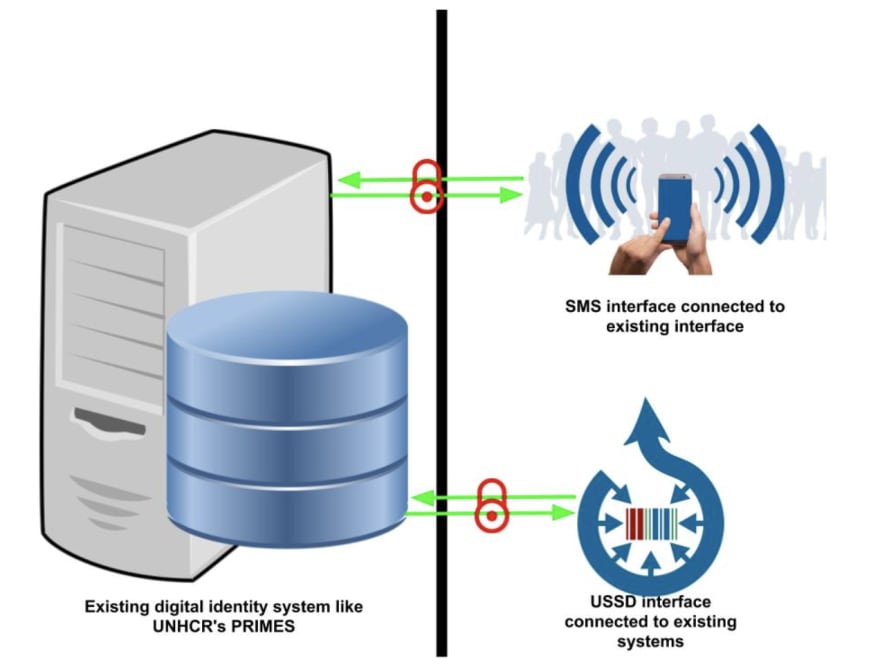The impact of an excellent digital identity on the life and wellbeing of refugees cannot be overemphasized. Digital Identity can, for example, allow the forcibly displaced to prove their identity to register SIM cards in their own names, access financial services (such as opening a mobile money account), to undertake university courses online which might otherwise be inaccessible and to be awarded recognized qualifications in their own name.
In emerging economies and those under crisis, internet connection is often unavailable. Current digital identity platforms require an internet connection to synchronize locally collected data to existing identity information databases. In systems that have been designed to solve the issue of limited internet access, collected data is either stored locally on a laptop or in a local database and then synchronized to a central server once an internet connection is available.
Crisis without Digital Identity
Refugees Identity Certificate is a document that refugees use as proof of identity. Having no identity can affect their ability to access essential services, including social security payment. Refugees without identity have struggled to access health services. Some refugees with no identity experienced restrictions on their ability to access humanitarian and development assistance.
In Kenya, for example, Refugees without legal documentation cannot travel beyond their local communities because if they do, the police will arrest them because they don't have any means of identification. Refugees lack access to Charities' goods and services, including food, shelter, and medical care. As a result, they are left with no option but to beg from their registered counterparts. Children are exposed to xenophobic attack, They face discrimination, child labor, and early marriage.
A lack of identity documents also means refugees live with the constant fear of being arrested and deported back to Somalia. In January 2018 alone, An NGO offering legal aid to refugees reported that 31 Somali nationals, including minors, were detained in Garissa, northeastern Kenya, and charged with being unlawfully present in Kenya. If the refugees cannot pay between $100 and $1000 fine, they send them to jail for three months.
Internet-independent digital identity connector
SMS is a globally available technology that does not require internet access. Many emerging economies are successfully using SMS and USSD to power systems in the financial industry, government, etc. In a West African country, Nigeria, Mobile Money, and USSD transactions enable seamless and instant transactions. A buyer gets the seller's 10 digits NUBAN, a Nigeria Uniform Bank Account Number (NUBAN), and initiates a transfer transaction right from their feature phone, and the receiver, a market woman with a phone without internet, receive the money instantly. It can verify that the money is in her account, all without internet access. SMS and USSD powered platforms like NUBAN are inclusive, robust, fast, and arguably more user-friendly.

Fig 1: Internet-independent connector
I propose an Internet-Independent connector to the existing banking, healthcare, and other systems. The system will serve as an additional layer to existing data management systems like the UNHCR PRIME and NUBAN to be connected using an Application Programming Interface (API). The system will expose a phone number that can be communicated to from another phone number in language and syntax that it understands. A UNHCR representative on the ground in a location without the internet can seamlessly validate a refugee's information via regular SMS and USSD. This can feed into trusted digital identity platforms like Securekey's Verified.me Identity network to power verification of individuals when they seek asylum in countries like Canada.
Benefits and Challenges of Offline Digital Identity
Benefits of Digital Identity systems without Internet
The UNHCR is currently running some pilots to provide internet service to refugees. Although some of the pilots have been successful, there is still limited internet connectivity in many locations that refugees live and require assistance. With an internet-independent system, refugees can be added to existing digital identity systems, provided with services, and verified without an internet connection.
Additionally, building on top of existing systems is cost-effective and more efficient because the existing systems have been created to be robust and resilient, and migration from them might not be practical. For example, over 7 million of the World's 25.4 million refugees are registered in UNHCR's digital Population Registration and Identity Management Ecosystem ("PRIMES "). Migrating all these users to a new system is not only time-consuming but technically challenging. In short, providing an excellent digital identity for refugees is a technical problem and a business problem.
Challenges of Offline Digital Identity Systems
Although there are numerous benefits of managing refugee identity information in real-time without an internet connection, there are a few challenges. One of the challenges is that SMS and USSD are limited. There's only so much that can be done from a mobile phone with little characters. The real estate limits the information that can be viewed or provided. Thankfully, the internet-independent layer is not the primary interface for interacting with the data and is only meant to augment the existing rich web-based user interfaces and experiences.
Closing and Recommendation
I believe that leveraging existing digital identity systems and augmenting them for efficiency and flexibility can provide digital inclusions for more refugees and draw us closer to delivering an excellent digital identity ecosystem to support the Global Compact on Refugees.
A combination of Auth0 and SMS system like Twilio are options that we can explore to offer an inclusive digital






Top comments (0)